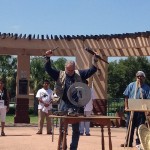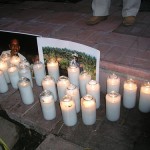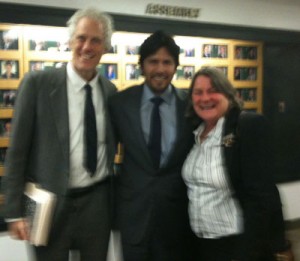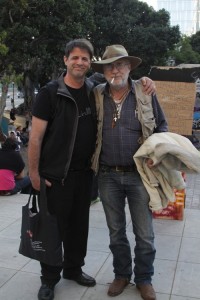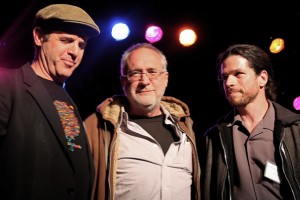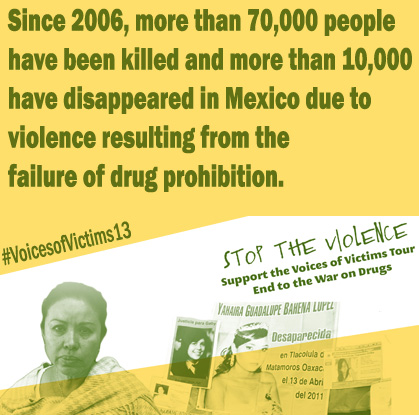 The “Voices of the Victims” tour is calling for an end to a drug war that has killed over 70,000 people in Mexico since 2006. The tour begins an 11 city bi-national tour starting in Denver at the Drug Policy Alliance meeting on October 23rd.
The “Voices of the Victims” tour is calling for an end to a drug war that has killed over 70,000 people in Mexico since 2006. The tour begins an 11 city bi-national tour starting in Denver at the Drug Policy Alliance meeting on October 23rd.
Following last year’s unprecedented 27-city Caravan for Peace, this year’s tour will once again feature Javier Sicilia and will put faces and stories to the horrible statistics and help facilitate an honest discussion about the failed war on drugs that includes acknowledging the suffering of real people.
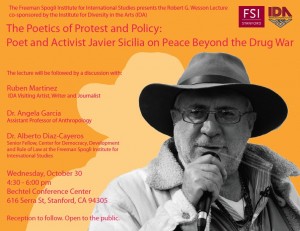 The discussion about potential alternatives to the current drug policy regime has gone from quiet whispers to more assertive calls for action in many countries across the hemisphere.
The discussion about potential alternatives to the current drug policy regime has gone from quiet whispers to more assertive calls for action in many countries across the hemisphere.
Since last year’s caravan journey across the United States there have been undeniable shifts in attitude on drug policy, gun safety, and even immigration policy.
For the first time ever opinion polls reveal that more Americans favor decriminalization of drugs than oppose it.
- Immigration reform legislation is now being seriously debated in the US Congress.
- Gun safety legislation has stalled after a major effort, but will likely come back to the forefront.
- And importantly, citizens in Colorado and Washington voted to regulate marijuana.
- In South America, Uruguay will legally regulate marijuana at a national level.
- And at the urging of Colombian President, Jorge Santos the Organization of American States (OAS) organized a broad international study group earlier this year to issue a scenario report on drug policy reform options in the Western Hemisphere.
A broad consensus on both the need to rethink drug war dogmas and to regulate marijuana as a simple and logical first step is forming among health professionals, police, local politicians, business leaders and the public.
The Voices of the Victims tour aims to advance the debate about solutions, specifically as it relates to the escalating violence in Mexico, the mass incarceration in north and the failures of the current models in dealing with the issue.
Kicking off in Colorado, 18 representatives from the Mexican victim’s organization the Movement for Peace with Justice and Dignity will participate in panels looking to discuss alternatives to current drug policy. In Seattle the group will be hosted by the ACLU and will look to build on the success of the popular ballot initiative to regulate marijuana.
Crossing the border into Canada the Voices tour will be meeting with public health and harm reduction experts to look at alternative ways to deal the drug issue. Community events in San Francisco and Los Angeles will focus on the Poetics of Protest and Policy and Javier Sicilia’s unique story.
“Our purpose is to honor our victims, to make their names and faces visible,” Sicilia said. “We will travel across the United States to raise awareness of the unbearable pain and loss caused by the drug war – and of the enormous shared responsibility for protecting families and communities in both our countries.”
Palo Alto organizer, Ruben Martinez says: “Sicilia comes with a profoundly moving story and message. His 24 year old son Juan Francisco was killed in a cartel-related crime in 2011. Sicilia made his pain and rage public with an open letter with the refrain “Estamos hasta la madre!” (colloquial Mexican Spanish for “We’ve had it!”), calling on all sides of the conflict — including Americans, whose drug and gun market is fully implicated — to a moral reckoning. He is a founder of Movement for Peace with Justice and Dignity, and has led several marches and caravans across Mexico and the U.S.”
The tour will continue to:
- Tucson, AZ Nov. 1-2
- Toronto, ON Nov. 4
- Ottawa, ON Nov. 5
- Chicago, IL Nov. 6-7
- Los Angeles, CA Nov. 8 -10
- Washington, DC Nov. 12,13
- and ends in Jackson, MS Nov. 15
 TAKE ACTION
TAKE ACTION
- Keep an eye out for updates from the Voices of Victims tour right here on our People to People blog.
- Subscribe to this blog to receive new posts as soon as they are published!
- Follow hashtag #VoicesofVictims13 to keep up to date about the Voices of Victims tour.

